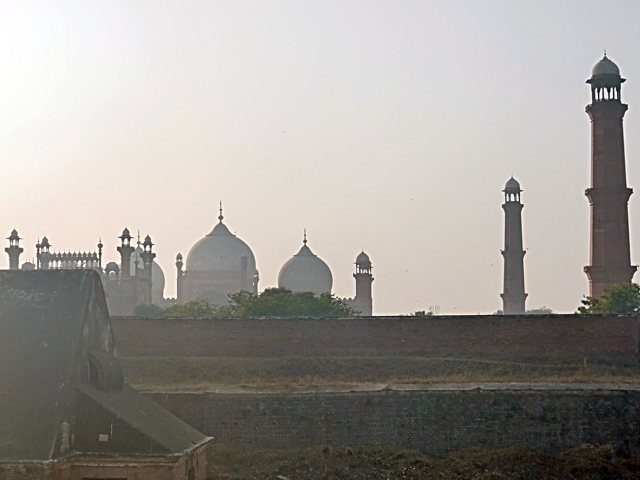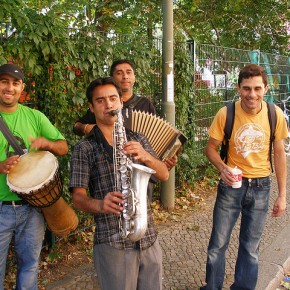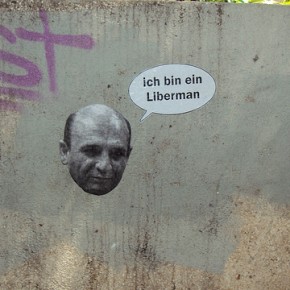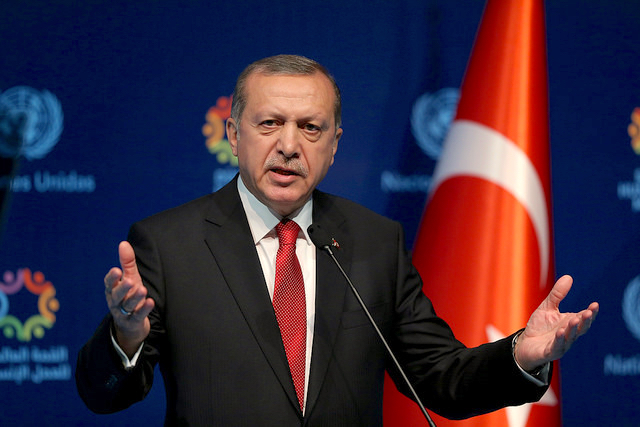Driving into Old Lahore, the streets narrow, crowded with motorbikes zipping dangerously close to brightly-painted busses packed with passengers spilling out of their doors. Cracked concrete steps lead into doorways. Clusters of men sip tea served from steaming cauldrons in front of shabby looking cafés.
Looking up, I see taller buildings, whose octagonal windows reflect the sunlight. Balconies with arched detail mimicking the minarets of a mosque are visible under the flapping flags of dingy laundry. Visible between the buildings is one of the most identifiable landmarks in South Asia, the Badshahi Mosque.
Turning onto a quieter side street, it appears as though we are driving straight toward that grand Lahore mosque. As we pull to a stop just shy of the barrier wall, a red-colored building on our right catches my eye. There is a clear glass shelf over one door, that upon closer inspection, I realize contains goldfish swimming among lily pads. There is an etching of a crucifix above a small fountain set into the cement of the entrance, and an elephant carved in teak above the door. Even a Buddha and a Krishna have found homes in the building’s façade.
I have reached Cuckoo’s Den. It stands between Heera Mundi or Diamond Market, an area where the dancing girls of Lahore once swayed and enticed men to set aside their morals and rupees for an evening, and the austere mosque from which the calls to prayer erupt powerfully five times a day.
I enter, and after ascending the spiraling stairs, emerge into the rooftop restaurant. From my table I can gaze simultaneously into the darkened allies of the Diamond Market and into the softly glowing courtyard of the mosque. I think of Tariq Ali’s description of the ancient Mughal city: the linear arrangement of the king’s fort, the king’s mosque and just behind it, the king’s prostitutes in this infamous red light district.
As an American woman, I was an outsider to Pakistan. As an outsider I was trying to understand the country beyond the headlines and the politics, and even beyond the middle class rhetoric of my hosts. So I came to this spot seeking another flavor of Pakistan. Thus I prepared to dine in the Cuckoo’s Den, squarely on the “wrong-side-of-the-mosque”.
Decency
I ate a lot of delicious dinners in Lahore, and at those meals I heard a lot about decency. Najma, my future mother-in-law, told me that decent girls don’t dance at their weddings, as they are somber and dignified occasions. The sister of our young Lahori host, informed me that she only goes out to dignified places at dignified hours, never associating with bad people who do bad things, like drinking or talking to men and dancing. (If she only knew what her brother had been up to the night before.)
Needless to say, you do not want to be labeled “indecent” in Pakistan. Who your family is, and what the neighbors think, may very well shape your destiny: where you attend college, your job and especially your marriage. It was within the confines of this social ranking system that Iqbal Hussain came into the world, like countless other children, born into the wrong-kind-of-family. But rather than hang his head in shame, the bastard child of a dancing girl, rather than disappear into shadowy doorways like the rest of “his kind,” Iqbal embraced his identity, his community and his past.
Painting Invisible Women
Despite Iqbal Hussain’s disadvantaged position, he found a mentor in a painting instructor at Lahore University and went on to become a professor of fine arts there. His artist expression was, and is, split between landscapes and portraits, but they all have the Heera Mundi as their focus; from the landscapes of his childhood home to the portraits of the dancing women he grew up with there.
With near desperation Hussain continues to paint prostitutes, trying to capture their beauty, their sadness and their humanity. Unlike his landscapes, which are painted using soft colors in a dreamy, impressionistic way, the portraits of the women are sharp, realistic and unforgiving, in an affirming way. Rather than romanticize these women like he does his landscapes, the painter’s portraits capture the women’s realness, the humanity in their every flaw.
Iqbal Hussain’s women all have deeply sad eyes, staring off into the distance or peering strait out from the canvas disinterestedly. One of his paintings features a massive woman in a striped black and white dress sitting cross-legged on a straw mat with her head held high, nothing more than a warm orange color as her backdrop. Her bulk takes-up nearly the entire frame. The woman’s size is contrasted by her soft, sorrowful face, which appears almost childlike. Hussain sighed as he explained that after a few minutes in front of the canvas, the women unfailingly broke down into tears, telling him their stories. He always listened, as only someone who is one of them could.
Iqbal Hussain continued to paint and live in the house he grew up in, and his mother arranged a marriage for him to a girl from the community. He told me,“No matter what people might say about my wife, about where she comes from, she is a great woman. She cooks for me and takes care of my home, and she raised my children. You know, my oldest is in Canada? They all went to college and they are happy. Yes, she is a very fine woman. She runs the restaurant, takes care of the bills and all of the other things I don’t care for. She makes it possible for me to just paint, to live this beautiful life.”
The painter remembers his childhood home being filled with literature and music and vivacious women. There was sorrow for these women then too, but the worst was yet to come. His childhood was a time when mostly prominent government officials and business leaders came to his mother and her cohort for simulation of many kinds, not just for unions of the flesh. It was only after General Muhammad Zia-ul-Haq decided to “clean up” Pakistan that the prominent men stopped coming to the Diamond Market. Afraid that their activities would be publicly exposed, the dignitaries switched to call girls and rented rendezvous apartments.
With the higher-class men gone, the poorer, uneducated men began to frequent the Heera Mundi. They were not interested in dancing and conversation, and they lacked the kind of money their predecessors had brought to the neighborhood. The culture of the Heera Mundi, and the women who stayed, began to deteriorate. There was little dancing, no more literature and far more clients to serve. But Hussain stayed, even after his mother died, and continued to paint the women, to bear witness to their stories the only way he knew how. Then, in 1996, he decided it was time to bring people back to the Diamond Market in a new way, so he began offering simple meals at his childhood home, which also served as his art gallery. He named the small restaurant after his mother, calling it Cuckoo’s Den.
People told Hussain he was a fool. Pakistanis sneered at him for trying to revitalize such an indecent area, and for five years almost no one came. Then, an American diplomat came to see him about having a portrait done, and was enamored by Iqbal’s paintings, food and story. Word spread, and foreigners began flocking to the unusual restaurant set in such an unlikely corner of Old Lahore. There was a look of mild disgust on Iqbal Hussain’s face when he explained that where the foreigners go, the local elites will follow. Almost overnight the Cuckoo’s Den became a status symbol. With every fine meal served, came the opportunity to voyeuristically peer into the abject world below, offering “decent” Pakistanis an illicit thrill.
Dinner in the Den
Though the red light district of the Heera Mundi has vanished, the neighborhood’s association with the haram is still strong. My future mother-in-law, a conservative Pakistani woman, was uncomfortable dining here and averted her eyes from the portraits lining the walls, though all the figures were fully dressed. Even our young Lahori guide was more excited by the daring of our dining choice than I would have expected, considering that all that lay below us to bring to mind the women who once called out from the doorways were darkened alleys. Our varying responses to Cuckoo’s Den were silenced by our unanimous delight in the perfect meal that we ate.
We had ordered a feast of Chicken Achar, tender grilled cubes of chicken breast marinated in a spicy-tart blend of pickled mango, hot chilies and creamy yogurt, Chicken Boti, a simple chicken kebab, rubbed with dry spices, and the best spinach I have ever tasted, simmered with cream, a mild masala blend and topped with a thick pad of fresh butter. These dishes were accompanied by a cornucopia of breads, from thick, pillowy naan, to the crisper, thinner butter naan and both the thin, tortilla-like baked roti and the light-flakey rounds of fried parata.
This food was not that of the lower classes, who eat at small, corner cafés, like the ones I saw driving in. Their food would include a hearty lentil dish and a large round of naan, perhaps a little ground meat on some days, but nothing as complex nor as rich in meat and fat. Our meal that night was the Mughal cuisine Lahore is famous for, the cuisine of kings. When I asked Iqbal how he developed the menu, he shrugged and said that all the recipes are his wife’s. She is the one who runs the kitchen, teaching the cooks how to prepare each dish properly.
The next day I dined in a rich, prominent Pakistani’s home. His wife and her servant prepared a Lahori spinach dish and some roti for us in addition to a few other things. I greedily piled the spinach on my plate, remembering the luscious flavor of the Lahori spinach Iqbal had served me the night before. But, there was no resemblance to his spinach in the vinegar-heavy, bitter saag I had just mounded on my plate.
The other dishes were fine, but lacked the flavor and sophistication of Iqbal’s dishes. It was like tasting the difference between green bean casserole and green bean almandine, one was simply a lesser imitation of the other. It struck me as strange that the dejected children of whores carried on the culinary legacy of Lahore’s royal past while these decent people, the elite, had let it dissolve into mediocrity.
Indecent Kindness
Far from merely titillating the wealthy with his royal cuisine and growing rich as a result of their hungers, Iqbal Hussain remains an intimate part of his community, despite what the gentrification of the neighborhood around his home and restaurant might suggest.
At the bottom of the precarious stairway leading back to the ground level from his restaurant, Hussain’s paintings cover the walls. Those that cannot fit on the walls are spread suggestively on a bed. In the middle of the crowded room is a stack of books containing pictures of his artwork and a brief history of his life. They are large and beautiful and expensive by Pakistani standards, but much cheaper than his original paintings. He uses all the proceeds from these books to take care of the dancing girls, both old and not so old.
Hussain explained that many of these women became sick, or addicted to drugs as the clients changed and their lifestyles became more desperate. Without a social welfare system in place, these women have no one to take care of them when they grow old, sick, or in danger of losing their homes, so he sets aside money specifically to provide for them when they are in need. In Pakistani culture, this would normally be the duty of a son or husband; to the indecent, family-less women of Lahore, Iqbal has become just that. When Hussain looks at the young he still sees the beautiful dancers singing and reciting poetry and the tears of women without any options. When he looks at the old, I think he must see his own mother’s face.
I naively imagined that Hussain’s generosity and kindness would make even the most conservative Pakistani question their assumptions about him, I was sure that Najma would be impressed by this man’s compassion, after all, she was abandoned by her husband and left with two little boys to care for.
Thus, it came as a surprise when she suddenly said that she “pitied that poor man, being born into the world with no real options”, but she “simply could not condone his support of these vile women”. Najma may have been a divorce’, but her decency remained intact. She was able to rely on her brother to support her, and on her educational background to create respectable work opportunities. I began to wonder if the entirety of the burden of decency falls on the women of Pakistan.
I soon learned that it does not. The carefree young man showing us the city came from a prominent family and was destined to take over the family business, despite the fact that he had his own dreams of becoming a singer and living a more bohemian lifestyle. His dreams were not entirely unrealistic, but to follow that dream, or even to voice his own ideological differences, would be a disgrace. After all, what would the neighbors think? It’s a shame, because he has a deep, rich voice.
The pressure of being decent in Pakistan is crushing. As an outsider and a westerner, my decency is automatically in question, and although I knew it was temporary, I still felt suffocated by the looks and the whispers. I could see the desperation to find reprieve from this pressure in so many of the young women and men I interviewed in Pakistan.
Rooftop Refuge
The bubbling spinach of Cuckoo’s Den was decadently, dangerously rich. However, it was also comforting and warming. I wanted to run back to the restaurant where I felt, for the first time since arriving in Pakistan, that no one was judging me. Returning to the roof the night after our feast to meet Iqbal Hussain for a smuggled glass of whisky felt like an escape from the restrictive world below. At that moment, I understood why he had stayed, despite his ability to leave, and the hostile urgings of the local mullahs for him to do so.
I sat facing the towering minarets of the Badshahi Mosque and let Hussain’s even, melodic voice and stories wash over me as I enjoyed my illegal drink, luxuriating in both his company and my own small act of defiance. It seems that the cost of opposing the status quo is often the label of indecency. But as Iqbal Hussain told me, “They did not like me and they do not like me, and I do not like them. But this is my home and I will never leave.”
Photographs courtesy of the author







